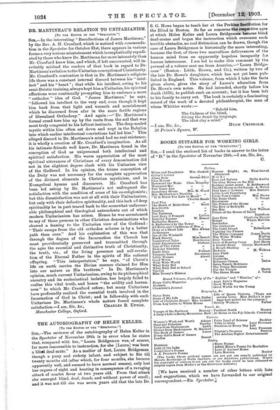DR. MARTINEAU'S RELATION TO UNITARIANISM
[To THE EDITOR OP THE "SPECTATOR-1
Ste,,—In the interesting "Recollections of James Martineau," by the Rev. A. H. Craufurd, which is noticed with commenda-
tion in the Spectator for October 31st, there appears in various
forma a very serious misstatement which is emphatically repudi- ated by those who knew Dr. Martineau far more intimately than Mr. Craufurd knew him, and which, if left uncorrected, will in- evitably mislead the readers of that book in regard to Dr.
Martineau's relation to the Unitarian conception of Christianity. Mr. Craufurd's contention is that in Dr. Martineau's religious life there was a constant internal discord between his " intel- lect " and his " heart " ; that while his intellect, owing to his semi-Deistic training, always kept him a Unitarian, his spiritual affections were continually prompting him to embrace a more
" orthodox " idea of God. "James Martineau," he says, "followed his intellect to the very end, even though it kept
him back from that light and warmth and nourishment which he discerned from afar in the more fertile regions of liberalised Orthodoxy." And again :—" Dr. Martineau's
formal creed tore him up by the roots from the soil that was most truly congenial to his loftiest instincts. The deep-souled mystic within him often sat down and wept in the Babylon into which earlier intellectual convictions had led him." This alleged discord in Dr. Martineau's mind had no real existence; it is wholly a creation of Mr. Cra,ufurd's imagination. As all his intimate friends well know, Dr. Martineau found in the conception of God as unipersonal both intellectual and spiritual satisfaction. His warm appreciation of the most spiritual utterances of Christians of every denomination did not in the slightest degree clash with his Unitarian view of the Godhead. In his opinion, the triune conception of the Deity was not necessary for the complete appreciation of the divinest elements in Christian mysticism, and in Evangelical hymns and discourses. Mr. Craufurd has been led astray by Dr. Martineau's not unfrequent dis- satisfaction with the condition of some of his co-religionists ; but this dissatisfaction was not at all with their Unitarianism, but only with their defective spirituality, and this lack of deep spirituality he in part traced back to the somewhat unfavour- able philosophical and theological antecedents out of which modern Unitarianism has arisen. Hence he was accustomed to say of those persons in other Christian denominations who showed a leaning to the Unitarian view of the Godhead : "Their escape from the old orthodox scheme is by a better path than ours." And his explanation of this was that through the dogma of the Incarnation the Church has most providentially preserved and transmitted through the ages the essential and distinctive truth of Christianity, the truth, viz., of the living presence and self-revela- tion of the Eternal Father in the spirits of His rational offspring. "This interpretation," he says, "of Christ's life on earth carries the Divine essence claimed for Him into our nature as His brethren." In Dr. Martineau's opinion, much current Unitarianism, owing to its philosophical ancestry and its ecclesiastical isolation, has largely failed to realise this vital truth, and hence "the aridity and barren- ness" to which Mr. Craufurd refers; but many Unitarians have profoundly realised the essential truth involved in the Incarnation of God in Christ; and in fellowship with such Unitarians Dr. Martineau's whole nature found complete


























































 Previous page
Previous page